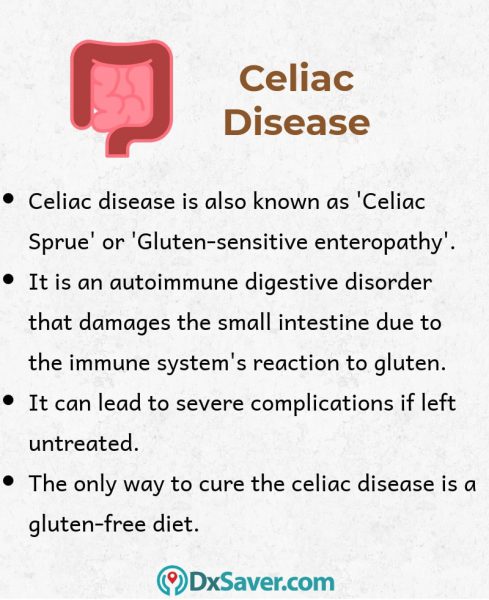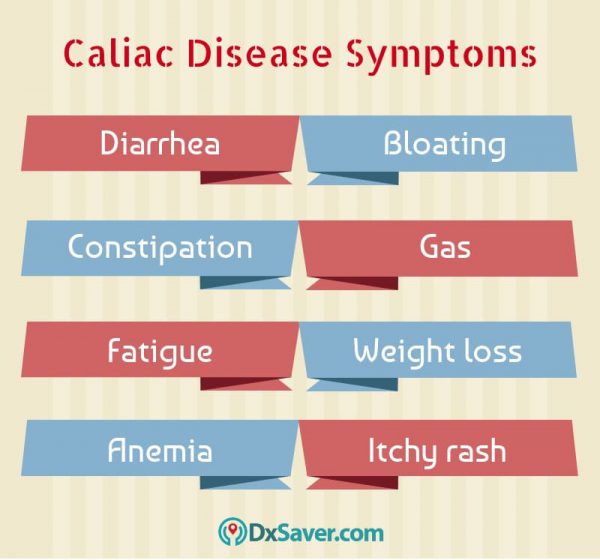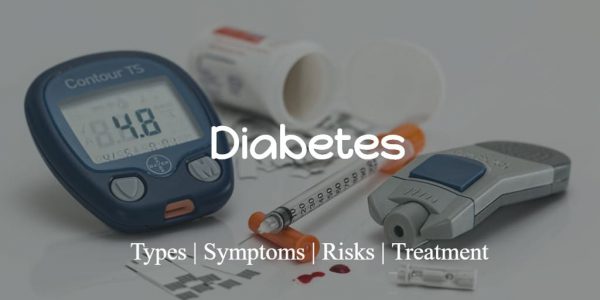
According to the University of Chicago Medicine, Celiac Disease Center, Celiac disease affects 1 in 133 average healthy people and nearly 3 million people are living with Celiac disease in the United States. Out of 3 million people, 97% of them are undiagnosed or misdiagnosed with other medical conditions. Early diagnosis of Celiac disease is very important as it might prevent complications such as neurological disorders, cancer, and infertility. So we highly recommend everyone who experiences the symptom of Celiac disease or who are at a higher risk of getting the disease to get tested for Celiac disease immediately.
The article below covers all the significant topics related to the Celiac disease test such as the Celiac disease test cost, what are the symptoms of Celiac disease, preparation, risks, complications, treatment, and how to test for Celiac disease.
- Celiac disease test cost
- What is celiac disesase?
- Is celiac disease autoimmune?
- What are the causes of celiac disease?
- What are the symptoms of celiac disease?
- How to test for celiac disease?
- Is there any preparation required before the test?
- Are there any risks in the test?
- What does the test result mean?
- Treatment for Celiac disease?
- Is celiac disease curable?
- Diet for Celiac disease
- What are the Celiac disease complications if left untreated?
- How to prevent Celiac disease?
- Provider Locations
For our readers, who are very much interested in knowing the Celiac disease test cost beforehand, we would like to begin with that section
How much does the Celiac disease test cost?
Celiac disease test cost ranges between $138 and $249 in different labs and facilities across the U.S. Celiac disease test is an antibody profile test that looks for various antibodies in the blood. The cost of the Celiac disease test also depends on the number of antibody tests included in the profile.
No prior appointment is required. Compare the price, order your test online and visit the nearest lab during lab business hours. Complete the procedure and get the results in your email in 2 to 3 business days.
The following table shows the Celiac disease test cost at 2 of our partner laboratories (CLIA – Certified) network located across the U.S.
Name of our Partner Labs | Book Online |
HealthLabs
| Offer Price$249 |
Personal Testing Lab
| Offer Price$138 |
Celiac disease test cost with insurance
Most of the health insurance policies in the U.S. cover the cost of the Celiac disease blood test. However, the coverage offered by private health insurance companies and national health insurance programs like Medicare and Medicaid might vary. So we recommend you to check the coverage of your health insurance plan before getting tested for Celiac disease.
Our Celiac disease testing providers do not accept any kind of health insurance plan. But, if the insurance company accepts to reimburse the cost, they can provide you with an itemized receipt containing all the details like the name and code of the test, and CPT code that is necessary for insurance reimbursement purposes.
What is Celiac disease?
Celiac disease is also known as “Celiac sprue” or “Gluten-sensitive enteropathy”. It is an autoimmune digestive disorder caused due to the response of the immune system to gluten. Gluten is a protein found in the wheat, barley, and rye. When a person affected with Celiac disease intakes gluten, the reaction caused by the immune system damages the small intestine over time that involves inflammation and destruction of the villi (tiny finger-like projections that are found along the wall of the intestine). The damage in the villi can lead to malabsorption of nutrients. If left undiagnosed, this can result in serious complications.
Celiac disease testing
Celiac disease antibody test is a simple blood test done to diagnose Celiac disease. This test looks for certain antibodies such as antigliadin antibodies, endomysial antibodies, and anti-tissue transglutaminase antibodies in the blood. Higher levels of these antibodies indicate the immune system’s reaction to gluten.
Is celiac disease autoimmune?
Yes, celiac disease is an autoimmune disorder, as the immunity reacts against gluten-related food like wheat, barley, and rye. Thus, leading to damages in the small intestine caused by the immune system.

What are the causes of celiac disease?
Generally, Celiac disease is caused due to the intake of protein gluten and the abnormal countereffect of the immune system to gluten, which is found in foods such as bread, pasta, cereals, and biscuits.
When the immune system mistakes the gluten content as a threat to the body, it produces antibodies that cause the surface of your small intestine to become red and swollen. And it is not known why some have severe symptoms while others have mild-no symptoms.
The following are some of the factors to develop a celiac disease
Family history
Studies show that celiac disease is associated with a number of genetic mutations that affect a group of genes called the HLA-DQ genes. This type of gene is responsible for the development of the immune system and may be passed down through generations.
Other health factors causing celiac disease
- Type 1 diabetes
- Thyroid conditions
- Celiac disease can be triggered if you had a digestive system infection like rotavirus infection during early childhood.
- Ulcerative colitis
- Neurological disorders (which affects the brain and nervous system)
- Turner syndrome and Down’s syndrome
What are the symptoms of Celiac disease?
Children and adults who experience the following celiac disease symptoms can get tested. The symptoms of Celiac disease vary between children and adults.
Symptoms of Celiac disease in adults
- Diarrhea
- Loss of weight
- Fatigue
- Constipation
- Pain in the abdomen
- Bloating and gas
- Nausea
- Vomiting
- Anemia
- Itchy rashes
- Mouth ulcers
- Loss of bone density and bone pain
- Joint pain
- Headache
Symptoms of celiac disease in children
Researches show that feeding gluten to your baby’s diet before they turn 3 months old might increase their risk of developing celiac disease.
About one in 100 children have celiac disease, it is one of the most common health conditions in children. Symptoms of Celiac disease in children include
- Nausea
- Vomiting
- Bloating
- Swelling in the belly
- Constipation
- Gas
- Diarrhea
- Steatorrhea (pale and foul-smelling stool)
Sometimes, people with Celiac disease do not show any symptom and that makes the diagnosis difficult.
People with the following risk factors are at a higher risk of getting the Celiac disease. So physicians also recommend them to get tested.
- A family member who is having Celiac disease
- Type 1 Diabetes
- Autoimmune thyroid disease
- Down syndrome (a genetic chromosome 21 disorder causing developmental delays)
- Addison’s syndrome (a condition in which the adrenal glands do not produce enough hormones)
- Rheumatoid arthritis

How to test for celiac disease?
You can choose your most suitable celiac blood test provider form the above table and get tested by booking your slot. Celiac disease test is done using the blood sample.
During this test, a lab technician or a phlebotomist will cleanse the area to be injected with a disinfectant liquid and wrap a tight elastic band around the upper arm to make the vein visible and swell with blood. He/she then injects a needle to draw a sample of blood and collects the sample in a test tube. After the blood is drawn, he/she will ask you to apply pressure on the injected area with a cotton ball to stop bleeding. The collected blood sample is then sent to the lab for further analysis.
It takes less than 5 to 10 minutes to perform this test.
Is there any preparation required before the test?
There is no special preparation required before the Celiac disease blood test. But it is very important to have a diet that contains gluten. A gluten-free diet can make the blood test results look normal and might result in an inaccurate diagnosis. If you have any bleeding disorder, inform your physician or phlebotomist before the test.
Are there any risks in the test?
There are no possible risks or complications in the Celiac disease blood test. Sometimes, after the blood sample is drawn, you might feel dizziness, slight pain, bruise, or redness in the injected spot for a few minutes.
What does the test result mean?
If the Celiac blood test results show higher levels of antibodies, it indicates the immune system’s response to gluten and the possibility of Celiac disease. Your physician might order an endoscopy (a procedure that uses a long tube with a camera to view the small intestine) and take a tissue sample (biopsy) to analyze the damage of the villi.
Treatment for Celiac disease
To treat the celiac disease, your physician might recommend the following supplements if you have severe vitamin deficiencies due to the damage of the villi.
- Copper
- Folate
- Iron
- Vitamin B-12
- Vitamin D
- Vitamin K
- Zinc
Steroids and other medications such as azathioprine (Azasan, Imuran) or budesonide (Entocort EC, Uceris), might be prescribed if you have severe intestinal damage.
Is celiac disease curable?
Celiac disease cannot be cured. A strict gluten-free diet is the only way to manage Celiac disease. Even the intake of a small amount of gluten can damage the intestine without showing any signs or symptoms.
Diet for celiac disease
Eliminating gluten high foods is the only cure for celiac disease. The foods that are considered gluten high are listed below and should not be included in your diet. Other than these, you can take your regular foods and continue with your normal diet.
Foods to avoid for celiac disease
Following are the foods to be avoided for gluten intolerance conditions
- Wheat-based foods
- Barley
- Rye
- Triticale
- Malt
- Brewer’s yeast
Some of the processed food that is considered gluten-rich are
- Beer, porter, stout (contains barley)
- Bread
- Bulgur wheat
- Cakes and pies
- Candies
- Cereals
- Communion wafer
- Cookies and crackers
What are the Celiac disease complications if left untreated?
The untreated celiac disease can lead to the following complications
- Malnutrition – Due to the damage of the villi, it cannot absorb the nutrients and can result in anemia and weight loss.
- Osteoporosis (loss of bone density) or osteomalacia (softening of bones)
- Intolerance of dairy products
- Infertility
- Miscarriage
- Cancer
- Problems in the nervous system
How to prevent Celiac disease?
People who are at a higher risk of getting Celiac disease should follow a strict gluten-free diet. This is the only way to prevent the disease.
Provider Locations
Celiac disease antibodies test can be done in any of the following locations across the U.S. by visiting the nearest lab. To know the Celiac disease test cost, refer to the first section of the article.
- Alabama
- Arizona
- Arkansas
- California
- Colorado
- Connecticut
- Delaware
- Florida
- Hawaii
- Georgia
- Idaho
- Illinois
- Indiana
- Iowa
- Kansas
- Kentucky
- Louisiana
- Maine
- Michigan
- Minnesota
- Mississippi
- Missouri
- Montana
- Nebraska
- Nevada
- New Hampshire
- New Mexico
- North Carolina
- North Dakota
- Oklahoma
- Oregon
- Pennsylvania
- Puerto Rico
- South Carolina
- South Dakota
- Tennessee
- Texas
- Utah
- Vermont
- Virginia
- Washington
- West Virginia
- Wisconsin
- Wyoming
Frequently Asked Questions
Will insurance cover my testing cost?
No, insurance will not be covered in the billing. However, they will provide you a receipt for insurance reimbursement purposes.
How should I book my appointment?
You can choose the most suitable provider from above and make an appointment by following the instructions mentioned by them.
Can I cancel my lab test order?
Yes, you can cancel your lab test order anytime before your testing. A refund will be initiated after deducting the cancellation fee. However, cancellation is at the discretion of the provider.
Do the providers offer result interpretations?
Yes, a few providers may provide doctor consultation who will take you through the results and provide clarification if needed.
How do I receive my report?
To ensure your privacy, the test report will be mailed to you by the provider.
Other topics you may be interested in:-
- What STDs cause Sore Throat?
- Do STDs Spread Via Kissing?
- Anti-Mullerian Hormone, AMH Test Cost in the U.S.
- How much does the Ovarian Cancer, CA – 125 Test Costs in the U.S?
- Cost of Cancer Tests in the U.S.
- What is Oral Chlamydia? Get Tested for Chlamydia STD at-home
- Is Bacterial Vaginosis an STD? Know more about its Causes, Symptoms & Treatment
- STD Test Cost in Atlanta, Georgia
- Eye Chlamydia Symptoms
- STD Testing Cost in San Diego, California
- What is Lyme Disease | Lyme Disease Testing near me
- How much does the Ferritin Test Cost in the U.S?
- Cost of Cortisol Testing in the U.S.
- Lipid Profile Testing, Normal Levels & Diagnosis
- At-Home Chlamydia Testing Cost in the U.S.
- HPV in Women: Symptoms, Genital Warts, Treatment and More
- Causes of Penile Rashes and Other STD Symptoms in Men
- Hepatitis B Symptoms, Causes, Treatment, Prevention and Risk
- LDH Hormone Normal Levels, Abnormal Levels Symptoms, Diagnosis & Treatment






